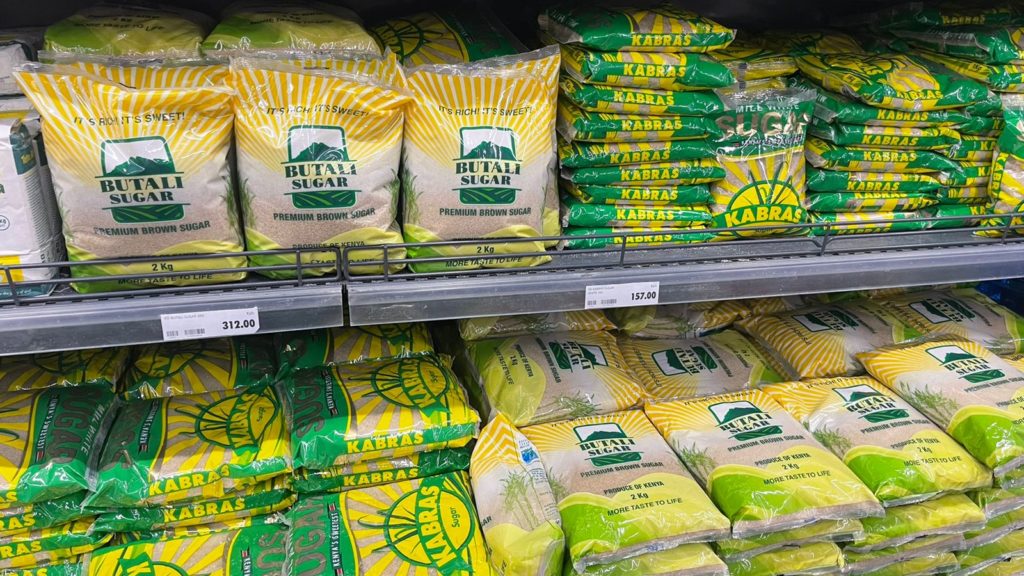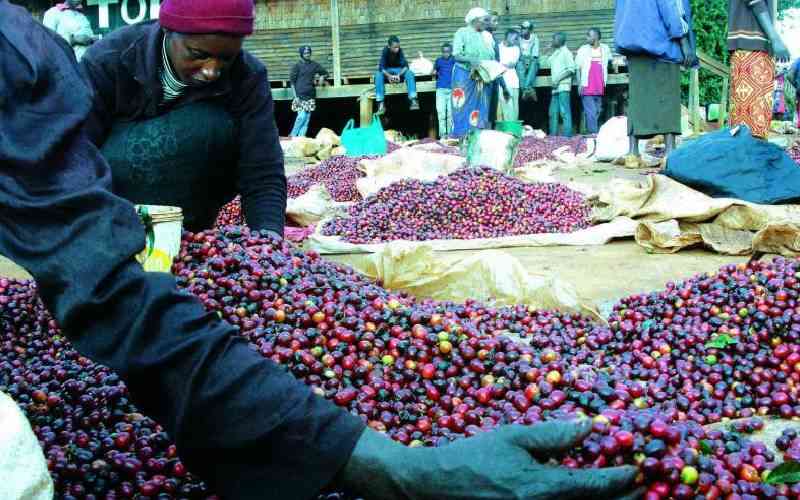The government has ordered all individuals and companies involved in sugar repackaging to register with the Kenya Sugar Board by November 17, 2025, in a fresh bid to eliminate substandard and adulterated sugar from the market.
In a public notice issued on Tuesday, the Board invoked powers under Section 61 of the Sugar Act, 2024, and the Sugar (General) Regulations, 2025, directing every repackaging entity to comply with the new registration requirement.
According to the Board, the exercise will enhance traceability, tighten quality control, and ensure only certified sugar reaches consumers. It will also help regulators monitor sugar movement from factories to shelves amid rising concerns about food safety standards.
“All sugar repackaging entities are required to register with the Board,” the notice read in part, adding that the process will be conducted through the Integrated Management Information System (IMIS) portal at imis.ksb.go.ke. Only firms meeting the set quality and documentation standards will be approved.
The Kenya Sugar Board said the initiative forms part of broader government efforts to streamline the sugar value chain from production to retail to protect farmers, eliminate illicit trade, and guarantee consumers access to quality products.
This directive comes at a time when Kenya’s sugar industry is facing serious challenges. Data from the Kenya National Bureau of Statistics (KNBS) shows that between January and August 2025, local sugar production dropped by nearly 25 per cent from 541,681 tonnes in 2024 to 406,807 tonnes this year.
The decline has been linked to a severe shortage of mature cane caused by overharvesting and reduced cultivation. The Kenya Sugar Board in July ordered the temporary shutdown of seven sugar factories, including Mumias, Butali, West Kenya, Nzoia, Naitiri, Busia Sugar, and Olepito, to prevent the milling of immature cane and curb illegal harvesting.
The shortage has driven up retail sugar prices and strained supply, forcing the government to allow duty-free imports to stabilize the market.
As Kenya moves to restore order in the sector, the new registration deadline is expected to weed out rogue traders, protect consumers, and restore public confidence in one of the country’s most crucial agricultural industries.







I like this web blog so much, saved to fav. “I don’t care what is written about me so long as it isn’t true.” by Dorothy Parker.
Hiya! Quick question that’s completely off topic. Do you know how to make your site mobile friendly? My blog looks weird when viewing from my iphone4. I’m trying to find a theme or plugin that might be able to fix this problem. If you have any suggestions, please share. Many thanks!
I have been examinating out some of your articles and i must say pretty good stuff. I will surely bookmark your site.
I just could not depart your site before suggesting that I really enjoyed the standard info a person provide for your visitors? Is gonna be back often to check up on new posts
I am often to blogging and i really appreciate your content. The article has really peaks my interest. I am going to bookmark your site and keep checking for new information.
I intended to put you the little remark just to thank you as before with the nice suggestions you have provided above. It is simply tremendously open-handed of you in giving openly what a number of people could have supplied as an electronic book to earn some dough on their own, primarily considering that you could have done it if you considered necessary. Those advice likewise acted to become a great way to understand that many people have the identical zeal really like my very own to find out whole lot more around this issue. I know there are several more enjoyable situations ahead for individuals that go through your blog post.
Some really fantastic work on behalf of the owner of this web site, utterly great written content.
Very efficiently written post. It will be useful to anyone who utilizes it, as well as me. Keep doing what you are doing – looking forward to more posts.
us online casinos that accept paypal
References:
http://www.129koreaems.com
online casino for us players paypal
References:
martdaarad.com
Our licensed casino status provides players with legal recourse and protection under Curaçao
jurisdiction. This gaming licence ensures we meet
international standards for online casino operations.
This casino security framework safeguards personal details and financial
transactions throughout your gaming experience.
These services help players manage gambling-related debt and develop sustainable budgeting strategies.
All payment methods undergo rigorous security screening, supporting over 25 processors
including major credit cards and cryptocurrencies.
Mobile transactions maintain the same limits with minimum deposits from $10 and daily
withdrawal limits up to $3,000.
We maintain fair gaming standards through eCOGRA and GLI auditing whilst providing secure account management systems.
We provide mobile-specific tournaments and competitions with prizes tailored for on-the-go gaming.
Our mobile platform offers exclusive promotional offers designed specifically for app users.
The application features an intuitive interface designed specifically for
mobile gaming with easy navigation and streamlined functionality.
Our Level Up Casino mobile app delivers exceptional performance on both iOS and Android
devices. Trustpilot reviews show the casino responds to 90% of negative feedback, demonstrating
commitment to resolving player concerns.
References:
https://blackcoin.co/casino-strategies-the-best-tips-tricks-profit-makers/
You made some nice points there. I did a search on the issue and found most guys will agree with your site.
If you’re playing on your phone or tablet, this is one of
the most stable casino apps you’ll find in 2025.
DraftKings puts real effort into making the mobile experience smooth, even during peak hours when other apps can choke.
No freezing, no lag when switching between games, and
no crashes mid-spin. DraftKings didn’t just tack on a casino to its sportsbook; it’s fully built into the platform, and it runs like it was always meant to be there.
The full Caesars Rewards program is synced across their digital and physical properties, so you can move between online play and resort comps.
Bet limits on table games are higher here than elsewhere.
Australian players looking to enjoy online casino Australia real money
games have plenty of chances to win big! Signing up with any of
my recommended real money Australian online casinos gives you access to over 5,000 games, sometimes even double that.
Most real money online casinos in Australia offer some
kind of bonus, especially when you’re just starting out.
That’s the only place online that offers legal online casino games for real money.
In fact, many real money online casinos insist you use the same withdrawal method as the method you used for depositing.
By practicing responsible gambling and utilizing available support,
players can enjoy online casinos while protecting their well-being.
That’s why more Aussies are turning to online casinos instead.
Once you’ve picked up a bonus or two, the real fun starts with the huge range of games on offer.
You’ll notice straight away how much more offshore Australian casino sites offer
when it comes to games. The table below lets
you quickly compare the top 10 Australian online casinos and their key features.
Keep in mind you will need to use these casino bonus
funds on eligible games in order to cash out any bonus winnings.
Keep in mind that there may be a minimum deposit amount and that games contribute different percentages depending on the bonus and site.
Thanx for the effort, keep up the good work Great work, I am going to start a small Blog Engine course work using your site I hope you enjoy blogging with the popular BlogEngine.net.Thethoughts you express are really awesome. Hope you will right some more posts.
Nice read, I just passed this onto a colleague who was doing some research on that. And he just bought me lunch because I found it for him smile Thus let me rephrase that: Thanks for lunch! “Love is made in heaven and consummated on earth.” by John Lyly.
I love how you balanced depth with readabilitythis post is both informative and easy to get through. Definitely one of my favorite finds this week!
Unsere Experten haben die rund 100 legalen Online Casinos Deutschlands verglichen und die besten deutschen Casinos für Sie ermittelt.
Die Welt der Online Casinos in Deutschland bietet eine beeindruckende Vielfalt an Spielen, innovativen Technologien und sicheren Spielumgebungen. Mit fortschreitender Technologie und sich
entwickelnden Vorschriften werden diese Plattformen weiterhin innovative Spiele und verbesserte Spielerfahrungen anbieten. Sie bieten verschiedene Werkzeuge und Ressourcen, um sicherzustellen, dass das Spielverhalten gesund bleibt und Spielsuchtprävention ernst genommen wird.
Diese Spielkategorie zählt aktuell zu den beliebtesten bei den deutschen Spielern, weswegen alles Live Spiele wie Blackjack, Baccarat, Roulette, Poker und Spielshows gefragt sind.
Glücksspiel-Anbieter ohne eigene Online-Glücksspiel-App sollten zumindest eine gut
angepasste mobile Seite, wie das Wunderino Casino vorweisen können. Von jedem Einsatz werden 5,3 % Glücksspielsteuer automatisch vom Betreiber abgezogen und an das
Finanzamt bezahlt. Am härtesten hat es wahrscheinlich die
Spielauswahl für legale Online Casinos getroffen.
References:
https://online-spielhallen.de/gizbo-casino-auszahlung-alles-was-sie-wissen-mussen/
Having gone through a similar experience myself, I found your insights particularly validating. You captured emotions I struggled to articulate, which made me feel less alone in my journey. Thank you for sharing something so personal.
Perfectly written content, appreciate it for entropy. “He who establishes his argument by noise and command shows that his reason is weak.” by Michel de Montaigne.
I’ll right away grab your rss feed as I can not find your e-mail subscription link or newsletter service. Do you have any? Please let me know so that I could subscribe. Thanks.
Awsome site! I am loving it!! Will come back again. I am taking your feeds also
I intended to write you a very small note to be able to say thanks a lot yet again about the unique basics you’ve shown on this page. It’s really extremely generous of people like you to convey freely what exactly numerous people could possibly have distributed for an ebook to get some money on their own, certainly now that you might well have tried it in the event you decided. The secrets also worked to be a good way to fully grasp many people have the same fervor really like my personal own to find out a lot more around this condition. I’m certain there are many more fun occasions ahead for people who go through your blog.
Nice post. I was checking constantly this blog and I am impressed! Very useful information particularly the last part 🙂 I care for such info a lot. I was looking for this certain info for a long time. Thank you and best of luck.
This web page is mostly a stroll-via for all the data you wanted about this and didn’t know who to ask. Glimpse right here, and also you’ll positively discover it.
Please let me know if you’re looking for a article author for your weblog. You have some really good articles and I feel I would be a good asset. If you ever want to take some of the load off, I’d really like to write some material for your blog in exchange for a link back to mine. Please shoot me an e-mail if interested. Many thanks!
Some truly superb info , Gladiolus I found this.
But wanna remark on few general things, The website pattern is perfect, the subject matter is real fantastic : D.
Some genuinely nice stuff on this website , I enjoy it.
I don’t unremarkably comment but I gotta admit thankyou for the post on this perfect one : D.
Hi my friend! I wish to say that this article is awesome, great written and include almost all vital infos. I?¦d like to peer extra posts like this .
But wanna state that this is extremely helpful, Thanks for taking your time to write this.
I got good info from your blog
I view something truly special in this web site.
Hello there! I know this is somewhat off topic but I was wondering if you knew where I could get a captcha plugin for my comment form? I’m using the same blog platform as yours and I’m having problems finding one? Thanks a lot!